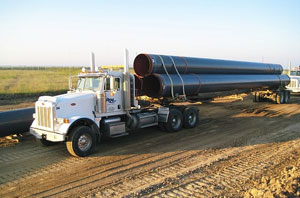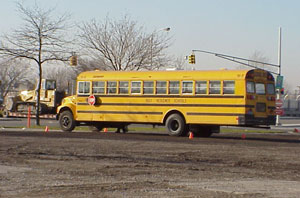Training Courses
A Certificate of Completion is Given for Each Course Upon Successful Completion

Stringer Truck
The Stringer Truck Driver course is designed to train Class A Commercial Drivers to safely transport pipe using steering trailers in both on road and off-road situations. Training will include General Safety, Pre-trip Inspections, Stretching and Shorting the Trailer and Adjusting Steering Cables. The course is taught in both classroom and field formats. Prerequisites: Class “A” Commercial Driver’s License with no restrictions, a clean driving record, hazardous materials endorsement preferred.

Crew Bus
The Crew Bus Driver course will teach drivers to safely operate a crew bus and to prepare them to take the Passenger Endorsement in their home state. The course is taught in both classroom and field formats. Prerequisites: At least a Class “B” Commercial Driver’s License with no restrictions, with clean driving record.

FORK LIFT
The Fork Lift course addresses lift truck operation safety in pipeline operations and in accordance with OSHA requirements. The course is taught in both classroom and field formats. Training can include both warehouse, lay down yard and rough terrain situations.

FUELER
The Fueler course focuses on HAZ-MAT training and various fuels and compressed gases used in pipeline construction. A certificate of completion is given upon successfully completing and fulfilling OSHA training requirements for First Responder & Annual Refresher under 29 CFR 1910.120 & 172.704.

MOROOKA
Morooka trucks are just one type of truck used on a pipeline construction job. Others can include a Lowboy, Flatbed or Float, Drop-deck, Dump Truck and a host of other different combination vehicles. The driver must have a Class “A” or Class “B” CDL depending on the type of truck used. It is helpful to understand or be trained on load securement requirements for the type of equipment or material being transported.

FLOAT/FLATBED
A Flatbed or Float is just one type of truck used on a pipeline construction job. Others can include Lowboy, Drop-deck, Dump Truck, Morooka and a host of other different combination vehicles. The driver must have a Class “A” or Class “B” CDL depending on the type of truck used. It is helpful to understand or be trained on load securement requirements for the type of equipment or material being transported.

LOAD SECUREMENT
Load securement training consists of properly knowing where to place a load on your truck or trailer so that your weight is evenly distributed and in the proper place for an adequate amount of tie-downs to be used. It provides all the tools for how many tie-downs to use on certain length and weight of your load that is in compliance with the Federal Motor Carrier Safety Administration (FMCSA).

CSA (Compliance Safety & Accountability)
Compliance Safety and Accountability (CSA) is a major safety measurement and reporting initiative of the Federal Motor Carrier Safety Administration (FMCSA). Every CDL licensed Driver and the Carrier that they work for has a CSA score. Any moving violation is entered into the CSA Data-Base with the FMCSA. The more violations you have, the higher your score is. Too many violations will result in the loss of your CDL.

DEFENSIVE DRIVING
Defensive Driving is a program designed either as a refresher for a veteran driver or a good basic training for new drivers. The main objective is to teach and reinforce that defensive drivers must be alert and in control of their vehicles, safety cushions, and themselves at all times. The course teaches drivers how to stay alert on the road and reviews hazards drivers may face on the road every day.
A Certificate of Completion is Given for Each Course Upon Successful Completion
Event and Class Schedule
There are currently no scheduled classes.
